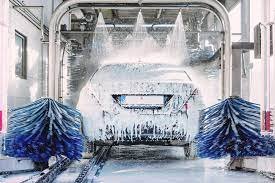Why are Automatic Car Washes Bad for Your Car?
Automatic car washes have become a staple in the lives of busy car owners. The allure of a quick, hands-free cleaning process appeals to those seeking convenience in maintaining their vehicles. However, beneath the surface shine lies a tale of potential hazards that can leave your car worse for wear.
The Process of Automatic Car Washes
Picture this: your car enters the sleek, automated tunnel, where a series of mechanical brushes and high-pressure water jets go to work. The process, designed to save you time, might be doing more harm than you realize.
Impact on Car Paint
As those bristles spin and water jets pound against your car's surface, you might unknowingly be subjecting your vehicle to a barrage of scratches and swirl marks. The automatic car wash's brushes, no matter how soft they claim to be, can be abrasive enough to etch into your car's clear coat over time.
Potential for Damage to Exterior
If your car boasts unique features like antennas, spoilers, or roof racks, beware. These intricate components might not fare well in the face of automated efficiency. The risk of these parts getting caught or damaged is a real concern, leaving you with unexpected repair expenses.
Chemical Concerns
Chemicals are the unsung heroes of automatic car washes, breaking down dirt and grime for that squeaky-clean finish. But not all heroes wear capes; some wear away paint, damage plastics, and deteriorate rubber seals. The aggressive nature of these chemicals can lead to premature aging of your car's exterior.
Water Pressure and Seal Issues
The forceful water jets might seem invigorating, but they can lead to a rather unwelcome consequence: water entering your car where it shouldn't. Imperfect seals around windows and doors can allow water to seep into your vehicle's interior, potentially causing rust and electrical issues.
Lack of Personalized Care
Unlike a professional detailer who knows your car inside out, automatic car washes lack that human touch. They can't discern the unique cleaning needs of your vehicle, leading to a superficial clean that leaves hidden nooks and crannies untouched.
Alternatives to Automatic Car Washes
Consider the good old-fashioned way: hand washing. Entrust your car to the expertise of professional detailers who understand the art of pampering automobiles.
Maintaining Your Car's Appearance
To mitigate the effects of automatic car washes, invest in regular waxing and protective coatings. The wax acts as a sacrificial layer, absorbing the brunt of environmental pollutants and minor scratches. Protective coatings, such as ceramic or nano-coatings, create an additional shield against the elements.
Environmental Impact
While automatic car washes might seem water-efficient, the reality is often quite different. These systems can consume a significant amount of water per wash, contributing to wastage. Additionally, the chemicals used can find their way into the ecosystem, potentially harming aquatic life.
Cost Considerations
Opting for automatic car washes might appear economical at first glance, but the hidden costs can add up. The damage inflicted on your car's exterior could lead to pricier repairs down the road, outweighing the initial savings.
Consumer Experiences
Stories abound of car owners who left automatic car washes with more than they bargained for – scratches, dents, and damaged parts. The frustration of realizing the damage only after the wash is an all-too-common scenario.
Educating Yourself
The key to avoiding the pitfalls of automatic car washes lies in education. You need to be aware of the potential risks and make informed choices. By understanding the consequences, you can make the best decision for your car's well-being.




